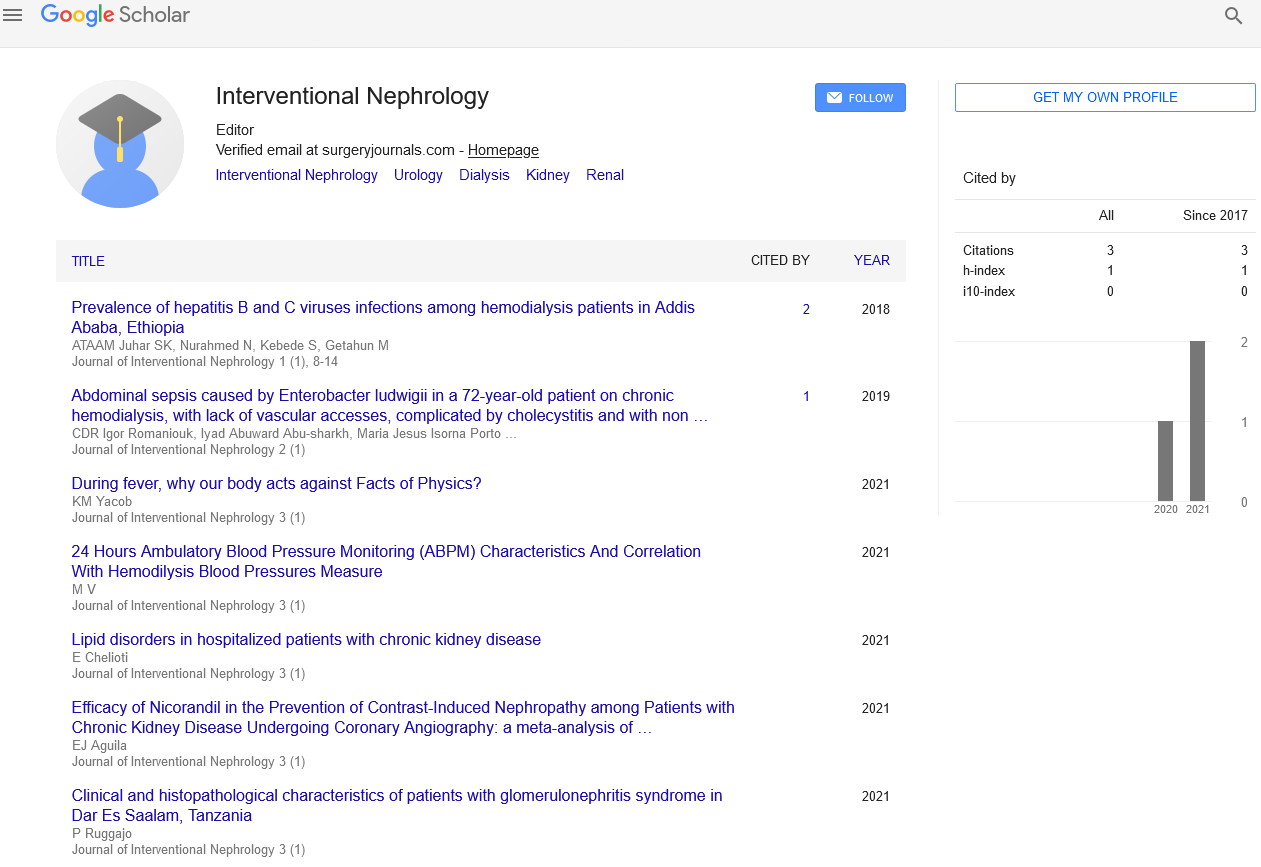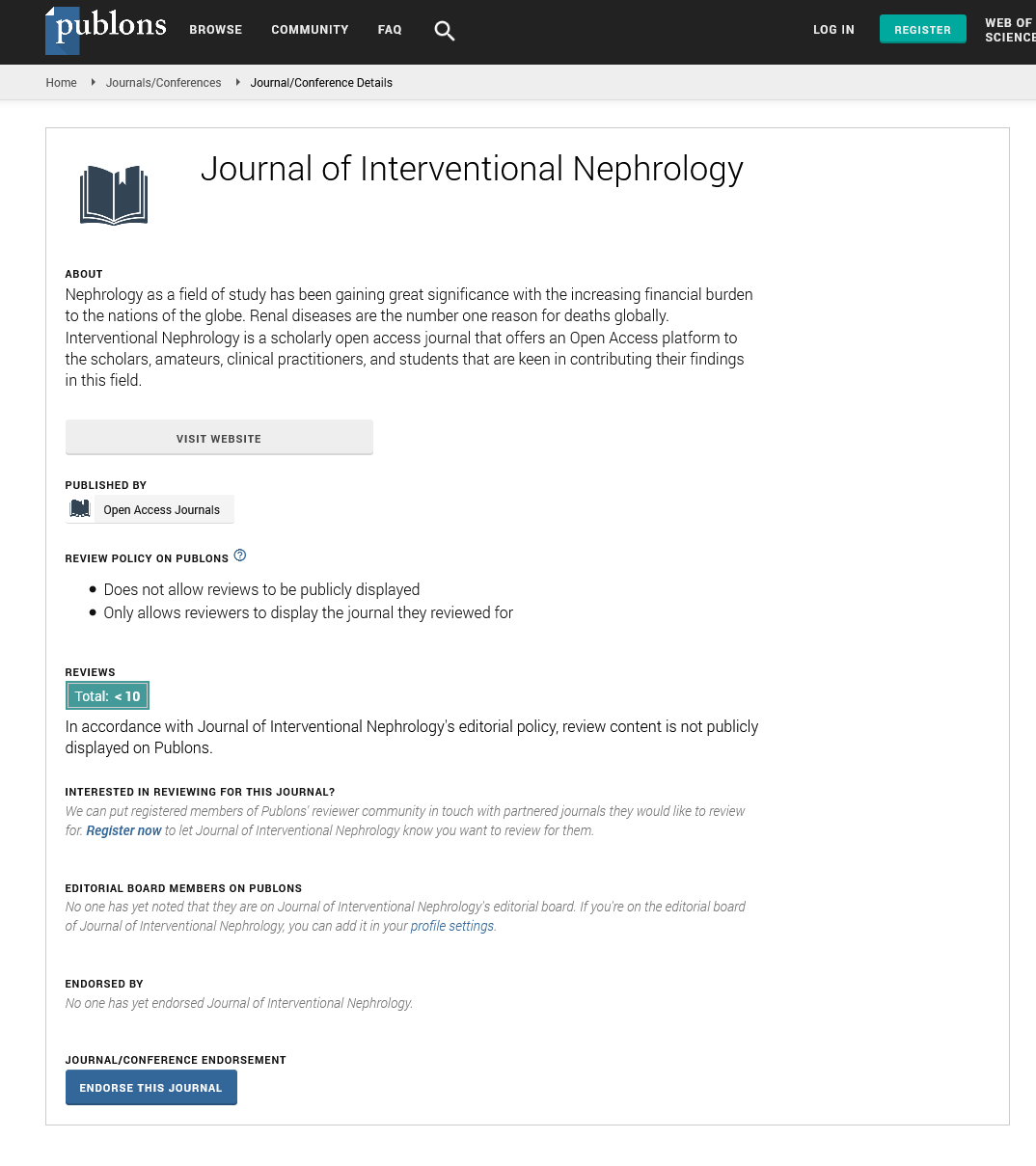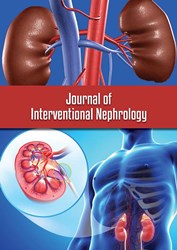Research Article - Journal of Interventional Nephrology (2023) Volume 6, Issue 2
Renal Disease: Types, Causes, Symptoms, and Treatments
Albert Einstein*
Department of Nephrology and Hypertension, Rabin Medical Center, Petah- Tikva, Israel
Department of Nephrology and Hypertension, Rabin Medical Center, Petah- Tikva, Israel
E-mail: albert.einstein@gmail.com
Received: 01-Apr-2023, Manuscript No. oain-23-96241; Editor assigned: 04-Apr-2023, PreQC No. oain-23- 96241(PQ); Reviewed: 18-Apr-2023, QC No. oain-23-96241; Revised: 22- Apr-2023, Manuscript No. oain-23- 96241(R); Published: 28-Apr-2023; DOI: 10.47532/oain.2023.6(2).29-31
Abstract
Renal disease is a condition that affects the kidneys’ ability to filter waste and excess fluids from the blood. There are several different types of renal disease, including chronic kidney disease, acute kidney injury, and polycystic kidney disease. The causes of renal disease can vary, but hypertension, diabetes, and autoimmune diseases are some of the most common. Symptoms of renal disease may not be noticeable until the disease is advanced, but can include fatigue, nausea, and swelling in the legs and ankles. Treatment for renal disease depends on the underlying cause and the stage of the disease, and may involve lifestyle changes, medications, dialysis, or kidney transplant. Preventing renal disease involves maintaining a healthy lifestyle and managing underlying conditions such as diabetes and high blood pressure. Early detection and treatment of renal disease are crucial for preventing complications and improving outcomes.
Keywords
Renal disease • Chronic kidney disease• Acute kidney injury • Kidney function • Symptoms of renal disease
Introduction
Renal disease refers to a condition in which the kidneys become damaged and can no longer function properly. The kidneys are responsible for filtering waste and excess fluids from the blood, and when they are unable to do so, it can lead to a variety of health problems. There are several different types of renal disease, and each has its own causes, symptoms, and treatments. Chronic kidney disease (CKD) is one of the most common types of renal disease [1]. It is characterized by the gradual loss of kidney function over time. CKD can be caused by a variety of factors, including diabetes, high blood pressure, and autoimmune diseases such as lupus. Symptoms of CKD may not be noticeable until the disease is advanced, but can include fatigue, nausea, and swelling in the legs and ankles [2].
Acute kidney injury (AKI) is another type of renal disease. It is characterized by a sudden loss of kidney function, often caused by a severe illness or injury. AKI can be caused by infections, medication side effects, and dehydration. Symptoms of AKI can include decreased urine output, nausea and vomiting, and confusion. Polycystic kidney disease (PKD) is a genetic disorder in which cysts form on the kidneys. These cysts can grow and interfere with the kidneys’ ability to function properly. PKD can lead to high blood pressure, kidney stones, and kidney failure [3].
Treatment for renal disease depends on the underlying cause and the stage of the disease. In some cases, lifestyle changes such as diet and exercise can help slow the progression of the disease. Medications such as angiotensin-converting enzyme inhibitors (ACE inhibitors) and angiotensin receptor blockers (ARBs) can help control blood pressure and protect the kidneys. In more advanced cases of renal disease, dialysis or kidney transplant may be necessary [4]. Dialysis is a process in which a machine filters waste and excess fluids from the blood, while kidney transplant involves replacing a damaged kidney with a healthy one from a donor.
Preventing renal disease involves maintaining a healthy lifestyle and managing underlying conditions such as diabetes and high blood pressure. Eating a balanced diet, getting regular exercise, and avoiding tobacco and excessive alcohol consumption can also help prevent renal disease [5].
Discussion
Renal disease is a complex and challenging condition that affects millions of people worldwide. Chronic kidney disease (CKD) is the most common form of renal disease and can progress slowly over many years. However, it can also develop rapidly, leading to acute kidney injury (AKI). The causes of renal disease are varied and can include hypertension, diabetes, autoimmune diseases, and genetic disorders such as polycystic kidney disease. Early detection of renal disease is crucial for effective treatment and management. Healthcare providers may use a variety of diagnostic tests, including blood and urine tests, to assess kidney function and identify any underlying conditions that may be contributing to the disease. Depending on the severity and stage of the disease, treatment options may include medication, lifestyle changes, dialysis, or kidney transplant [6].
One of the most significant risk factors for renal disease is hypertension. High blood pressure can damage the blood vessels in the kidneys, impairing their ability to filter waste and excess fluids from the blood. Angiotensinconverting enzyme inhibitors (ACE inhibitors) and angiotensin receptor blockers (ARBs) are commonly prescribed medications that can help control blood pressure and protect the kidneys [7].
Diabetes is another major risk factor for renal disease. High blood sugar levels can damage the small blood vessels in the kidneys, leading to nephropathy, a condition in which the kidneys become less able to filter waste and excess fluids. Glycemic control is essential for preventing diabetic nephropathy, and healthcare providers may recommend lifestyle changes, medication, and regular monitoring of blood sugar levels to help manage the condition. In advanced cases of renal disease, dialysis or kidney transplant may be necessary. Dialysis involves using a machine to filter waste and excess fluids from the blood, while kidney transplant involves replacing a damaged kidney with a healthy one from a donor. Both of these options come with risks and benefits, and healthcare providers will work with patients to determine the best course of treatment based on their individual needs and circumstances[8].
In addition to hypertension and diabetes, other conditions that can increase the risk of renal disease include autoimmune disorders such as lupus and rheumatoid arthritis, genetic conditions such as polycystic kidney disease, and urinary tract infections. Cysts, or fluid-filled sacs, can also form on the kidneys and increase the risk of renal disease. Lifestyle factors can also play a role in the development of renal disease. Smoking tobacco and consuming excessive amounts of alcohol can damage the kidneys and increase the risk of kidney disease. Eating a diet that is high in salt, sugar, and unhealthy fats can also contribute to the development of hypertension and diabetes, which can in turn increase the risk of renal disease [9].
Preventive measures for renal disease involve maintaining a healthy lifestyle, which includes regular exercise, a healthy diet, and avoiding harmful substances such as tobacco and alcohol. Healthcare providers can work with patients to develop personalized plans for managing underlying conditions such as hypertension and diabetes, which can help prevent the development of renal disease. Early detection and treatment of renal disease are critical for preventing complications and improving outcomes. Regular monitoring of kidney function through blood and urine tests can help detect early signs of kidney damage and allow for timely intervention. Additionally, it is important for patients with renal disease to follow their healthcare provider’s recommended treatment plan, which may include medication, lifestyle changes, dialysis, or kidney transplant.
Renal disease is a complex condition that can have significant impacts on a person’s health and quality of life. Preventing renal disease involves maintaining a healthy lifestyle, managing underlying conditions, and seeking timely medical intervention if symptoms arise. With proper care and management, many people with renal disease are able to maintain their kidney function and lead fulfilling lives [10].
Conclusion
Renal disease is a serious condition that can lead to a variety of health problems if left untreated. With proper treatment and management, however, many people with renal disease are able to lead healthy and fulfilling lives. If you are experiencing symptoms of renal disease, it is important to talk to your healthcare provider to determine the underlying cause and the best course of treatment. Renal disease is a complex condition that can have significant impacts on a person’s health and quality of life. Preventing renal disease involves maintaining a healthy lifestyle, managing underlying conditions, and seeking timely medical intervention if symptoms arise. With proper care and management, many people with renal disease are able to maintain their kidney function and lead fulfilling lives.
Conflict of Interest
None
Acknowledgement
None
References
- Kooman JP, Kotanko P, Stenvinkel P et al. Chronic kidney disease and premature ageing. Nat Rev Nephrol. 10, 732-742 (2014).
- Zoccali C. Traditional and emerging cardiovascular and renal risk factors: an epidemiologic perspective. Kidney Int. 70, 26-33 (2006).
- Weiner DE, Carpenter MA, Levey AS et al. Kidney function and risk of cardiovascular disease and mortality in kidney transplant recipients: the FAVORIT trial. Am J Transplant. 12, 2437-2445 (2012).
- Schepers E, Meert N, Glorieux G et al. P-cresylsulphate, the main in vivo metabolite of p-cresol, activates leucocyte free radical production. Nephrol Dial Transplant. 22, 592-596 (2006).
- Pletinck A, Glorieux G, Schepers E et al. Protein-bound uremic toxins stimulate crosstalk between leukocytes and vessel wall. J Am Soc Nephrol. 24, 1981-1994 (2013).
- Stevens KK, McQuarrie EP, Sands W et al. Fibroblast Growth Factor 23 Predicts Left Ventricular Mass and Induces Cell Adhesion Molecule Formation. Int J Nephrol. 29, 6 (2011).
- Rashid G, Benchetrit S, Fishman D et al. Effect of advanced glycation end-products on gene expression and synthesis of TNF-α and endothelial nitric oxide synthase by endothelial cells. Kidney Int. 66, 1099-1106 (2004).
- Xu G, Luo K, Liu H et al. The progress of inflammation and oxidative stress in patients with chronic kidney disease. Ren Fail. 37, 45-49 (2014).
- Poesen R, Evenepoel P, Loor H et al. The influence of renal transplantation on retained microbial-human co-metabolites. Nephrol Dial Transplant. 3, 1721-1729 (2016).
- Claes KJ, Bammens B, Kuypers DR et al. Time course of asymmetric dimethyl arginine and symmetric dimethylarginine levels after successful renal transplantation. Nephrol Dial Transplant. 29, 1965-1972 (2014).
Google Scholar, Crossref, Indexed at
Google Scholar, Crossref, Indexed at
Google Scholar, Crossref, Indexed at
Google Scholar, Crossref, Indexed at
Google Scholar, Crossref, Indexed at
Google Scholar, Crossref, Indexed at
Google Scholar, Crossref, Indexed at
Google Scholar, Crossref, Indexed at
Google Scholar, Crossref, Indexed at


